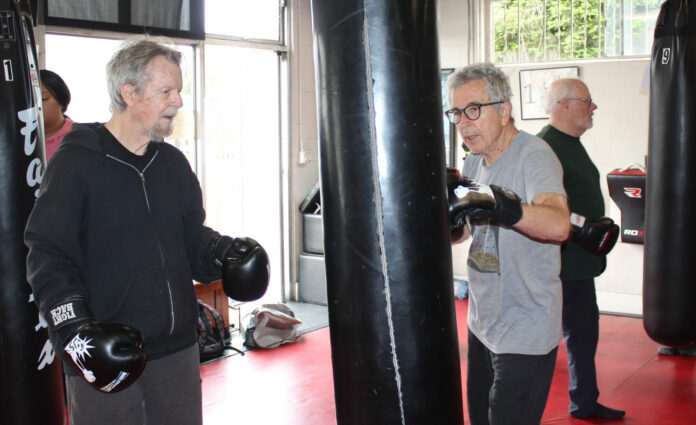
Back in 1971, when Aretha Franklin crooned, “Rock steady, baby / That’s what I feel now,” she was following in the footsteps of Alton Ellis & The Flames, who sang “Better get ready / Come do rock steady, ooh / You got to do this new dance,” back on a 1967 release.
On Monday, the dozen or so older adults gathered inside a nondescript building in Scotts Valley, standing in a circle next to a wall of mirrors, were learning a different kind of footwork—boxing moves. They’d arrived at Santa Cruz Boxing for the “Rocksteady” class.
But this was no ordinary senior boxing course.
What unfolded was a program tailored specifically for people suffering from Parkinson’s Disease, a brain disorder that causes a variety of motor-skill issues, from shaking to stiffness to poor balance, and causes memory problems.
“Let’s go on a picnic,” said instructor Brian Dunniway, the gym owner who was just two days shy of his 50th birthday. “We’re going on an island cruise and you’re gonna bring what?”
For this warm-up exercise, each selected an imaginary item that began with the letter of their first name as a ball was passed around; participants would have to recall what someone had thought up if they wanted to throw the sphere back to them later.
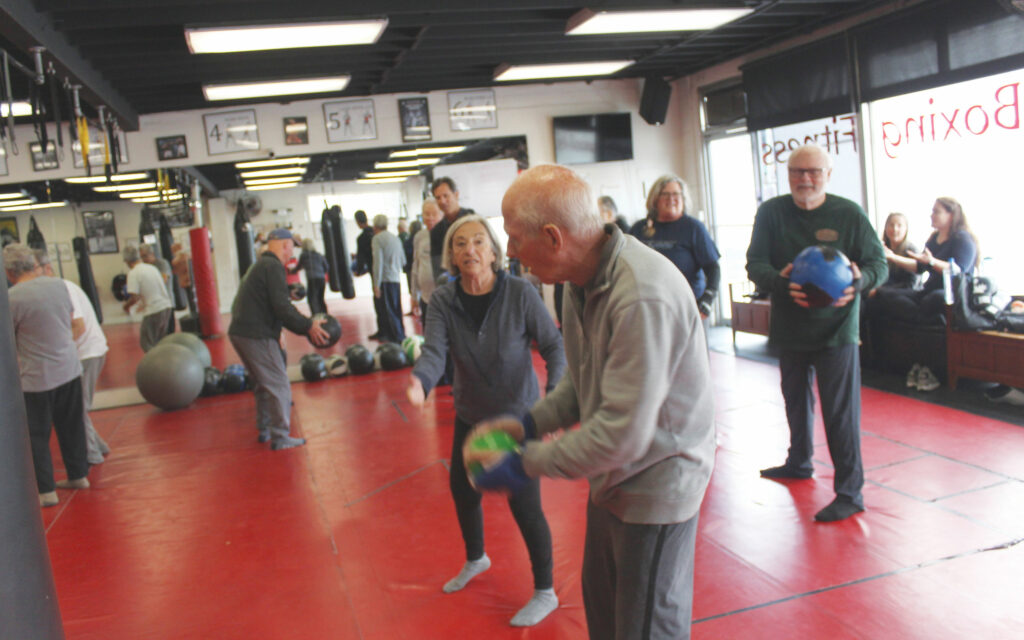
While the men mostly pretended they’d bring a food item to the exotic destination, Sheri Sobin, a 75-year-old from Scotts Valley, was practical in her choice: sunscreen. The predominantly male class did intimidate her when she first started going a couple months back.
“I walked in here and there was me—one woman,” she said on the sidelines later. “I was like, ‘I don’t know if this is going to work.’”
But she knew it was worth a try. After all, she was diagnosed with Parkinson’s five years ago.
“My husband had it before me,” she said.
“He gave it to her—that jerk,” Dunniway chimed in, making a joke referencing the fact that the disease, unlike Covid-19, is definitely not contagious.
It’s this kind of levity, in the face of incurable illness, that Sobin fell in love with.
“They’re encouraging,” she said of her classmates. “They’re just such nice guys.”
Having a place like this to go to on weekdays (the class runs Monday through Thursday, 11:30am-12:30pm) can be really beneficial, she notes.
“It’s getting the dopamine moving through the brain,” Sobin said. “Sometimes I feel slumpy, and then I feel alert after doing this.”
The whole session is carefully planned out, Dunniway explains.
“We want non-impact to start,” he said, noting the class was about to get a little bit more difficult. “It works their balance, which is really huge for them.”
The warm-up drew to a close and Dunniway turned the intensity up a notch.
“We’re gonna do a ‘1, 1, 2’ shadow box,” he said. “We’re gonna do this with partners, and it’s gonna get messy.”
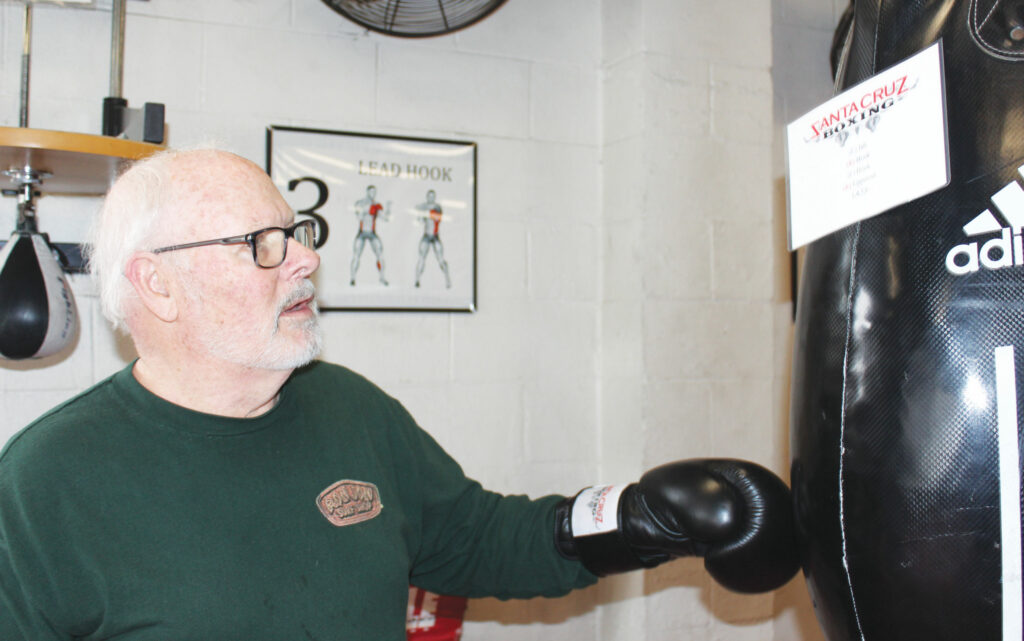
What followed was a blur of swinging limbs, pouring sweat and synchronized stepping, as attendees punched toward their opponent and worked together to make sure no one actually landed a blow.
Of course, you wouldn’t have been duped into thinking Joe Frazier or Floyd Mayweather Jr. was in the room, but with the decisiveness of the movements playing out, you might just forget the folks taking the class all have Parkinson’s.
One caregiver remained beside her client the whole time; two others sat on the sidelines, monitoring from a distance.
Melanie Day, 39, an in-home caregiver with Lifespan, an aging care management agency based in Santa Cruz, was thrilled to see how expertly Tim Znamirowski, her client, was handling the maneuvers.
“He had a slow morning,” she said, noting that’s when his legs tend to lock up. “Movement is the single most beneficial thing he can do.”
Plus there’s just nothing like a solid dose of camaraderie, she noted.
“He just loves the people,” she said. “He loves the community. That in and of itself is incredibly beneficial…They enjoy each other’s company so much.”
Znamirowski confirmed this assessment.
“Laughter’s a big part of it,” he said. “Sometimes we look at each other and it’s absurd.”
He says the group is open and inclusive.
“I come in here and I go out feeling better,” he said. “I can’t imagine not working out.”
The group even keeps a weekly Taco Tuesday appointment.
“Now get your gloves on and punch the bag,” ordered Dunniway.
That’s all the encouragement the boxers needed to start beating the bloody pulp out of the hanging cylinders. Some of them pack a pretty explosive punch.
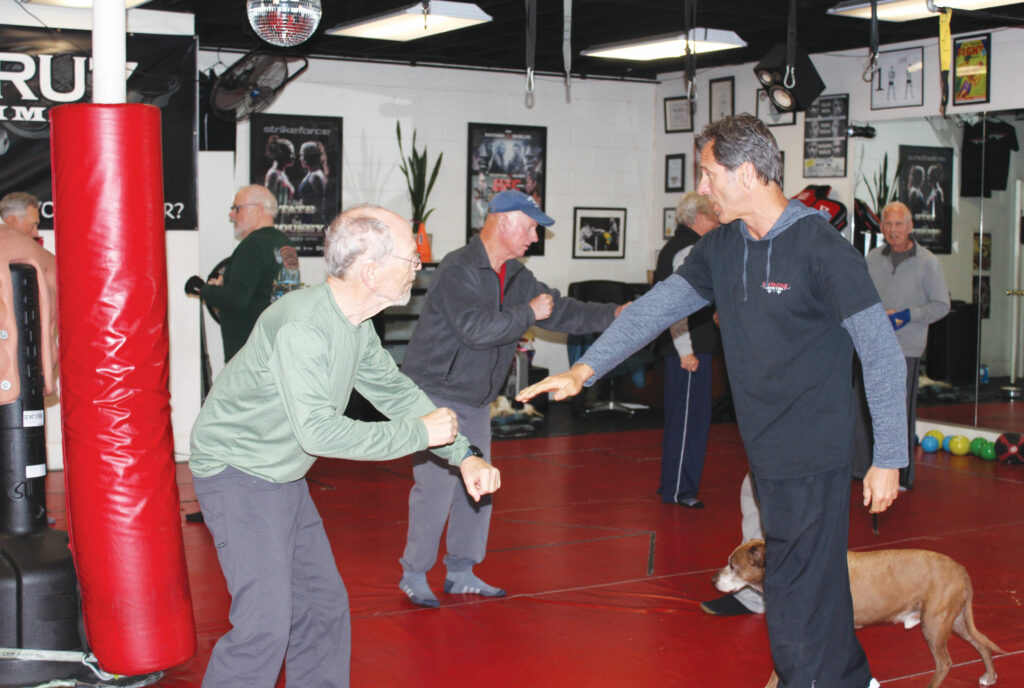
Who could forget the time Jim Bell, 83, of Scotts Valley scored a knockout on the piece of equipment. When asked about it, Bell played down his accomplishment like a humble champion talking to the press gallery following a KO win: “It wasn’t my punch.”
Dunniway admitted to the Press Banner that sometimes he’ll pretend to be affected by a punch when he isn’t actually phased, for effect. But he says as far as Bell’s takedown of the bag is concerned, that was the real deal.
They may not be spring chickens, but they continually manage to challenge stereotypes of what a person living with Parkinson’s is all about.
Day pointed to the yellow ball with a freaked-out face design on it, to drive the point home.
“You see how worried the beach ball looks?” she asked. “It’s with good reason. They’ve destroyed many of its brethren.”
Day knows how important physical activity can be for someone with Parkinson’s. Her own father has the disease and participates in Parkinson’s rock climbing sessions.
Other resources exist for people with the diagnosis, for example the Santa Cruz County Parkinson’s Group, which holds meetings on the first Wednesday of the month from 2-3:30pm at the Congregational Church of Soquel. And one of the Santa Cruz Boxing coaches, Robert Terrance, is planning on starting a Parkinson’s boxing class in Watsonville.
Sobin has come to rely on Rocksteady Boxing for her routine.
“I’ve been trying to do it four days a week,” she said. “It’s like, ‘OK, I have this today.’”
How did Stan Love, a 78-year-old from Aptos, feel about Monday’s class?
“Great—as usual,” he said. “It’s an excellent opportunity for a workout.”
John Sprague, 77, of Santa Cruz, agreed.
“It was a great class,” he said. “I had a lot of fun.”
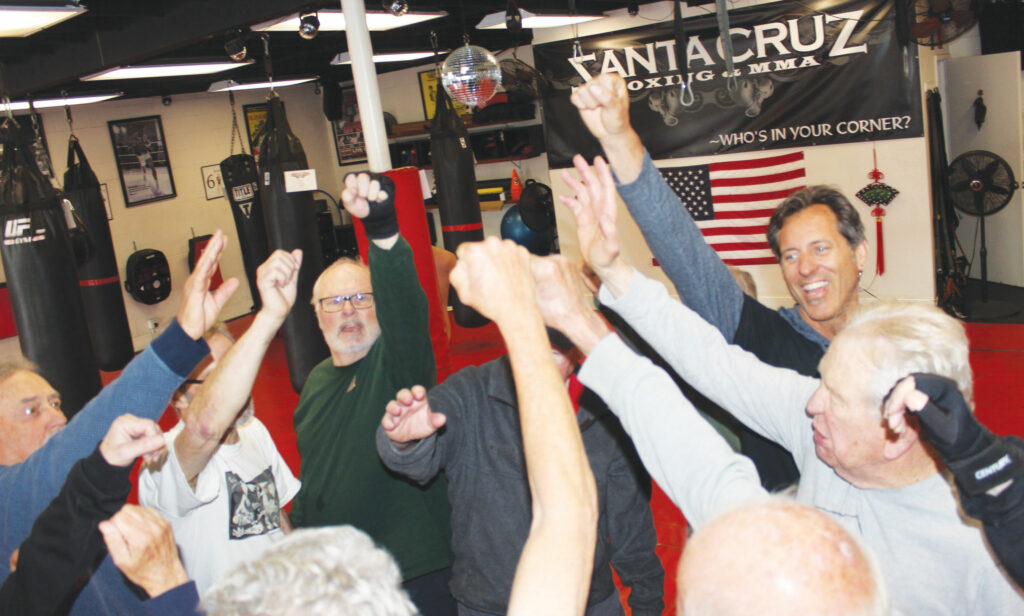
Dunniway said one difference with professional boxing is many—if not most—pupils openly take performance-enhancing drugs.
“Most of the members are on some kind of dopamine regulator,” he said. “They’ll usually take their meds right before class.”
While many participants wish they could rid themselves of the tremors they experience, that generally can’t be alleviated—although they may experience temporary relief post-class. However, boxing consistently will help improve mood, energy levels and balance, Dunniway says.
“We’re doing such dynamic movements in here,” he said. “I think the social aspect is what keeps them coming back.”
As exciting as the class is, there are still days where it’s difficult for members to convince themselves to hit the gym, Dunniway notes.
“Sometimes they don’t feel like coming,” he said. “But they’re always glad they did.”
People with Parkinson’s who are curious about what happens are welcome to come watch a class, he says.
“Because they all have Parkinson’s, they feel like, ‘Hey, they know what I’m going through,’” he said. “I guess they’re comforted to know they’re not alone.”
For more information, go to santacruzboxing.com.












